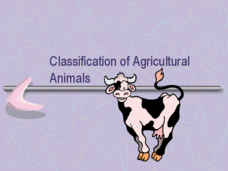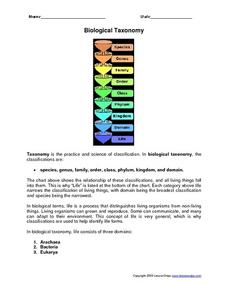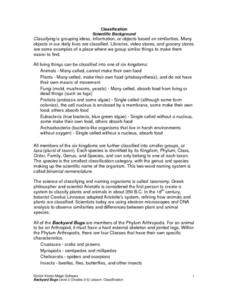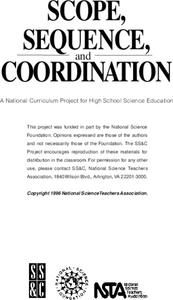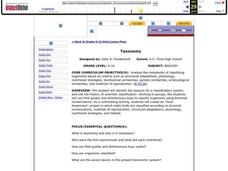Curated OER
Taxonomy - The Science of Naming Organisms
Carolus Linnaeus designed the binomial nomenclature system of naming organisms that is still in use more than 200 years later. By viewing this PowerPoint, upcoming biologists learn how to use it. They are also introduced to the hierarchy...
Curated OER
Taxonomy
Biology novices name the seven levels of classification and use binomial nomenclature for naming living organisms. The first half of this presentation bestows a brief history of taxonomy, while the second half instructs on how to use our...
University of Hawaiʻi
Taxonomy and Me!
Taxonomy is the study of organisms and how you phylum. Three biology activities are included, helping scholars understand four of the six kingdoms, specifically Protista, Plantae, Fungi, and Animalia. Scholars observe and classify...
LABScI
Taxonomy: Who is in My family?
Find similarities in seemingly unlike organisms. The second instructional activity in a series of 12 builds the concept of a taxonomy and explores the use of a dichotomous key. Learners begin in part one by attempting to group a set of...
Curated OER
Freshwater Fish Anatomy & Taxonomy
Tenth graders use a classification key to identify organisms. In this classification lesson plan students identify freshwater species of fish and document their observations.
Curated OER
What's Your Genus? Scientific Classification and the VT
Students learn about binomial nomenclature, the scientific system of classification. In this scientific classification lesson, students work cooperatively to complete a binomial scavenger hunt using the internet and a Visual Thesaurus....
South Gloucestershire Council
Animal Classification: A Collaborative Sorting Activity for Key Stages 2 & 3
Introduce the logic behind a dichotomous key or administer a group performance assessment with a fun and challenging classification lesson. With explicit instructions for the teacher and for collaborative groups, as well as engaging...
Curated OER
Classification of Agricultural Animals
Students of biology should find this powerpoint interesting as it recaps the basics of classification and Latin and common names of familiar farm animals. The slides are clear, not loaded with text, and lead the students through the...
Curated OER
INSECT TAXONOMY VIA THE INTERNET
Seventh graders explore how to classify insects and organize information.In this insect classification lesson students use the Internet to retrieve information on insects then organize the pictures to make a book project.
Curated OER
Taxonomy, Classification, and Dichotomous Keys
In this taxonomy worksheet, students use a dichotomous key for creatures found on planet Pamishan to identify each individual creature. This worksheet has 20 creatures to identify.
Curated OER
Animal Classification
Students are introduced to the concept of classification as it relates to objects, information, and characteristics. In this classification lesson plan, students research a variety of animals. Students study the Linnaeus's system...
Curated OER
Biological Taxonomy
For this biology worksheet, students read about biological taxonomy. They then use the information they learned to answer the 13 questions on the worksheet. The answers are on the last page of the packet.
Curated OER
Classification of Living Things
Biology learners will be able to explain the binomial nomenclature system and name the seven levels of classification of living things after viewing this set of slides. Brightly colored with bold fonts, the format is eye-catching, and...
Howard Hughes Medical Institute
Sorting Seashells
Scientists use morphological, physiological, and molecular information to continually revise organism classification. Scholars observe and learn about 20 shells. Then, they work to sort and classify the shells, building a taxonomy based...
Curated OER
Why Taxonomy?
Students investigate the need for taxonomy and perform a variety of activities that will make taxonomy real to them. They identify plants and animals in a specific area and record the information on a data sheet. They write stories...
Curated OER
Taxonomy Concept Map
Reinforce learners' knowledge of scientific taxonomy with a helpful concept map worksheet. Using a word bank, young biologists fill in the blanks to complete the description of organism classification.
Curated OER
Classification
In this classification worksheet, students complete a word search puzzle by finding 12 words associated with taxonomy and classification.
Curated OER
Taxonomy
In this biology worksheet, students complete a crossword puzzle with 39 questions on taxonomy. They identify the different classification systems used in biology.
Curated OER
Backyard Bugs
Explore the concept of scientific classification and the similarities and differences between plant and animal species. Your class will participate in hands-on activities by investigating dichotomous keys and classifying their shoes. To...
Curated OER
Classification Schemes
Junior biologists journey through the hiearchy of living things with these activites. Using a dichotomous key, they identify common algae, plants, and fish. They design their own key for a mixture of seeds and a collection of...
Curated OER
Taxonomy
Students analyze the complexity of organism classifications based on certain criteria. In this classifying organisms lesson students study taxonomy and gather information and leaves to do their own experiment on classification.
AAAS
Identification and Classification of Grassland Plants
Take learning outside and start classifying grasslands. Young ecologists observe grassland plants in order to classify them into the appropriate species by family. They note their characteristics and where they grow. A true...
Cornell University
Classification
Explore the scientific method of classification. An interactive activity asks learners to create a classification system for a group of objects and develop a flow chart to communicate their systems. In addition, individuals use a...
Science 4 Inquiry
The Classification of Living Things
It's a classification sensation! Demystify why we classify using an inquiry activity that helps your class sort things out. Groups begin by classifying a variety of shoes before they research organisms and design their own dichotomous...









